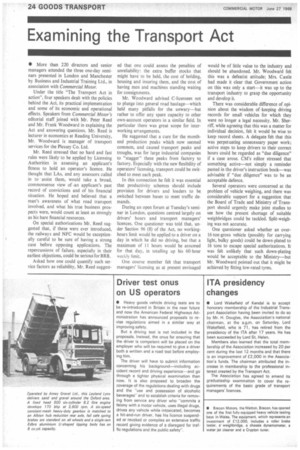Examining the Transport Act
Page 26

If you've noticed an error in this article please click here to report it so we can fix it.
• More than 220 directors and senior managers attended the three one-day seminars presented in London and Manchester by Business and Industrial Training Ltd.. in association with Commercial Motor.
Under the title "The Transport Act in action", four speakers dealt with the policies behind the Act, its practical implementation and some of its economic and operational effects. Speakers from Commercial Motor's editorial staff joined with Mr. Peter Reed and Mr. Frank Woodward in explaining the Act and answering questions. Mr. Reed is lecturer in economics at Reading University, Mr. Woodward is manager of transport services for the Plessey Co. Ltd.
Mr. Reed stressed that no hard and fast rules were likely to be applied by Licensing Authorities in assessing an applicant's fitness to hold an operator's licence. He thought that LAs, and any assessors called in to assist them, would take a broad. commonsense view of -an applicant's past record of convictions and of his financial situation. He hoped and believed that a man's awareness of what road transport involved, and what his true business prospects were, would count at least as strongly as his bare financial resources.
On special authorizations Mr. Reed suggested that, if these were ever introduced, the railways and NFC would be exceptionally careful to be sure of having a strong case before opposing applications. The repercussions of failure, especially in their earliest objections, could be serious for BRB.
Asked how one could quantify such service factors as reliability, Mr. Reed suggest
ed that one could assess the penalties of unreliability: the extra buffer stocks that might have to be held, the cost of holding, housing and insuring them, and the cost of having men and machines standing waiting for consignments.
Mr. Woodward advised C-licensees not to plunge into general road haulage—which held many pitfalls for the unwary—but rather to offer any spare capacity to other own-account operators in a similar field. In particular there was great scope for interworking arrangements.
He suggested that a cure for the monthend production peaks which now seemed common, and caused transport peaks and troughs, was for large industrial companies to "stagger" these peaks from factory to factory. Especially with the new flexibility of operators' licensing, transport could be switched to meet each peak.
In this connection he felt it was essential that productivity schemes should include provision for drivers and loaders to be switched between bases to meet traffic demands.
During an open forum at Tuesday's seminar in London, questions centred largely on drivers' hours and transport managers' licences. One questioner was told that, under Section 96 (8) of the Act, no workinghours limit would be applied to a driver on a day in which he did no driving, but that a maximum of 11 hours would be assumed for that day, in totalling up his 60-hour weckl■e. limit.
One course member felt that transport managers' licensing as at present envisaged
would be of little value to the industry and should be abandoned. Mr. Woodward felt this was a defeatist attitude; Mrs. Castle had made it clear that Government action on this was only a start—it was up to the transport industry to grasp the opportunity and develop it.
There was considerable difference of opinion about the wisdom of -keeping driving records for small vehicles for which they were no longer a legal necessity. Mr. Sherriff, while agreeing that this was a matter for individual decision, felt it would be wise to keep record sheets. A delegate felt that this was perpetuating unnecessary paper work; active steps to keep drivers to their correct hours could be regarded as "due diligence" if a case arose. CM's editor stressed that something active—not simply a reminder pasted in the driver's instruction book—was advisable if "due diligence" was to be an acceptable defence.
Several operators were concerned at the problem of vehicle weighing, and there was considerable support for a suggestion that the Board of Trade and Ministry of Transport should urgently make joint studies to see how the present shortage of suitable weighbridges could be tackled. Split-weighing was not accurate.
One questioner asked whether an over16-ton-gross vehicle (possibly for carrying light, bulky goods) could be down-plated to 16 tons to escape special authorizations. It was felt unlikely that such down-plating would be acceptable to the Ministry—but Mr. Woodward pointed out that it might be achieved by fitting low-rated tyres.


















































































































